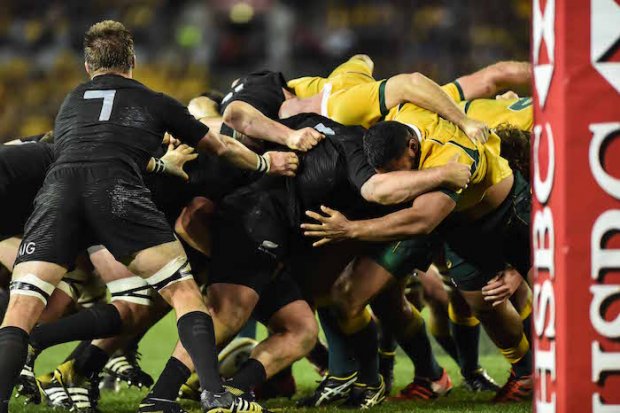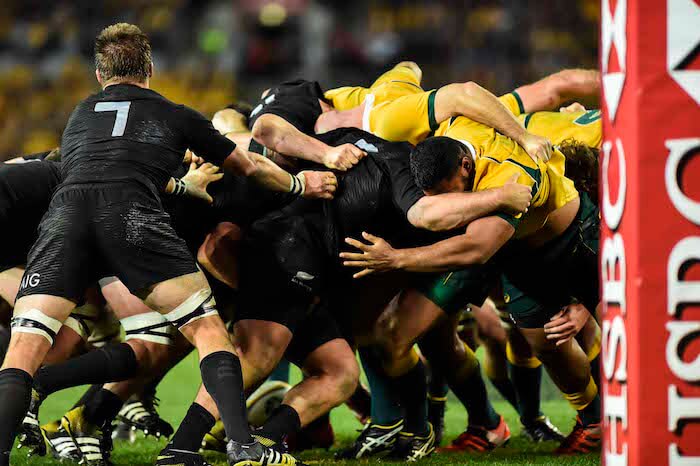As Australia recovered from a strong second at RWC 2015 and entered the slumber of summer, you could be excused for thinking World Rugby may have been running around the bars of Dublin drinking the profits and high-fiving themselves.
Did they do this? I reckon.
But they also did some homework and startlingly enough, they’ve sniffed the wind, heard the punters, and made some Law changes which should improve our great game. Of the changes made, here are the major ones which will impact rugby in Australia in 2016.
1. THE SCRUM
The heart of the dark arts has been tweaked, and to the aficionados of the NRC (which really, on this site, should be the lot of you), most of this will be no surprise. Key points:
Advantage. Subject to safety, if a scrum collapses or a player is popped, a referee can play on;
30 seconds. From the time of the referee making the mark, teams have 30 seconds to be in “crouch” mode, otherwise a Free Kick (FK);
“Use It”. Applies IMMEDIATELY when the ball is at the 8’s feet, and the scrum is not moving forward, similar to a ruck scenario. If not, scrum to the opposition;
Legal Wheel through 90 degrees. Previously a turnover, now merely a reset;
The Pocket. Halfbacks no longer allowed in the pocket between the flanker and the 8. Penalty Kick (PK) is the sanction.
WINNERS
- Spectators. Most of these changes are designed to get the ball into play quicker, and keep it there longer, as experienced in the NRC. Repeated resets should diminish significantly, not only because the ball will be out, but there is less incentive to cause the issue in the first place.
- Referees. Referees hate scrum resets as much as anyone. Referees also hate adjudicating wheeling scrums (was it legal, was it 90 degrees, was it a whip wheel, was the tight head asleep?). Again, less incentive to wheel. It WILL still happen, but not as much.
- 15 man rugby. Backs – should see more ball more often.
LOSERS
- The masters of the dark arts – now less mystique needed.
- 10 man rugby teams – key parts of Africa and large parts of Europe will be affected.
- Insomniacs.
2. THE MAUL
This one is HUGE. Rumours were flying around during 2015 that there would be an interpretation change prior to RWC, but in the end, World Rugby didn’t want to upset everyone’s apple-cart prior to their showcase event, so they waited. In simple terms: NO SWIMMERS! The ball must be passed to the back of the maul, rather than have the player holding it slide (i.e. “swim”) back.
WINNERS
- Classicists. This is the way it should be, and the way it was, until everyone decided to turn a blind eye. Back to the Future it is, but it makes the maul a more pure creature once again. It also makes it more of a contest and gives the defending team more opportunity.
LOSERS
- David Pocock. No chance he’ll ever top a season try-scoring tally again.
3. THE END OF THE MATCH
This has its history in a 2015 Six Nations Scotland v Wales match. If a conversion or penalty kick is made prior to the expiry of time (i.e. the strike of the ball), there will be a restart, even if the clock expires thereafter. For example, the conversion is made at 79:50, and by the time the players return to halfway, the clock is 80:00, but play will recommence, and the match will end when the ball is next dead.
WINNERS
- Spectators (I see a theme emerging…). More ball in play, more bang for the buck.
LOSERS
- Time wasters.
- Buggered forwards.
- Lazy backs.
- Referees (another thing to think about) and timekeepers (no pressure, but everyone is watching you).
4. “THIS IS NOT SOCCER”
One word – simulation. It ain’t a “thing”. It ain’t gonna happen in our game, and the masters have nailed it. Expect a high level of enforcement. It could be called the “Hooper clause” based on the Oscar antics of his opponent in South America last year.
WINNERS
- Everyone, except those who speak a language where inanimate objects have a gender.
5. STRIPPERS
Now that I have your attention…stripping is still allowed, but assuming everyone is facing in the right directions (you’ll have to work out that for yourselves), it won’t be deemed a knock-on by the ball carrier. Same same if said stripper is actually a knocker and knocks it out of the hands.
WINNERS
- Ball carriers. Now they can blame someone else.
LOSERS
- Defenders. If you’re a knocker and get it wrong, it’s still a penalty for a deliberate offence. Be very, very careful.
BUT WHAT DOES IT ALL MEAN?
A pleasant surprise really – the net effect of these changes should be more rugby played each match, which should lead to a higher tempo and more action. The big winners – the spectators, and teams who like to play that style of game. All good for the ANZACs. The next piece of the puzzle will be the detail of how the referees manage that, which is something we will cover shortly. Stay tuned!



